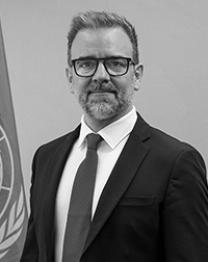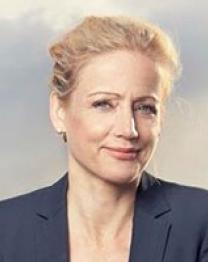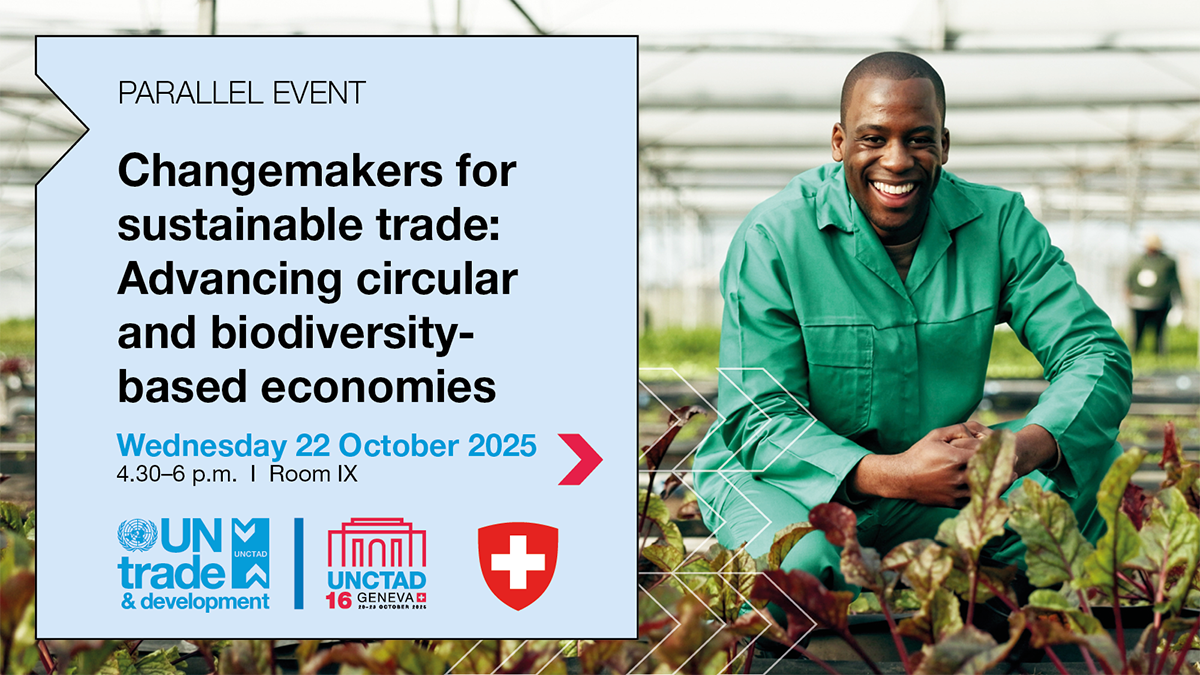
The event examined how circular and biodiversity-based economies can drive sustainable trade and development, particularly in developing countries.
In his keynote address, Pierre Marcolini, artisan chocolatier, highlighted the importance of authenticity, traceability and equitable partnerships with producers in achieving sustainability across value chains.
Speakers from Cameroon, Sweden, Switzerland, Ghana and South Africa underscored that trade must become a driver of environmental stewardship, equity and resilience. They emphasised the need for stable policy frameworks, inclusive trade systems and strengthened public–private partnerships to ensure that sustainability requirements enhance competitiveness and market access for small producers.
Discussions showcased UNCTAD’s BioTrade Initiative and the Sustainable Manufacturing and Environmental Pollution (SMEP) programme as practical instruments supporting inclusive, biodiversity-based and circular business models.
Participants agreed that sustainability must be central to global trade, ensuring that economic progress goes hand in hand with the protection and restoration of the natural environment.
Can we trade and build prosperity without eroding the very ecosystems that sustain life?
Across developing countries, local producers, circular economy entrepreneurs and biodiversity-based businesses are at the forefront of building a sustainable trade future.
Their practices show that trade and environmental stewardship can be mutually reinforcing, generating jobs, incomes and climate-resilient growth while protecting natural ecosystems. However, they often operate in fragmented markets, face high barriers to scaling up and are largely left out of global trade and policy discussions.
Discussions at this event will spotlight the important but often overlooked contributions of local changemakers in developing countries.
The economic and environmental importance of biodiversity and circular business models will be explored, and the systemic challenges these actors face in accessing international markets, attracting investment and shaping policy frameworks will be addressed.
On showcase will be how the BioTrade Initiative of UNCTAD and the Sustainable Manufacturing and Environmental Pollution programme, implemented in partnership with UNCTAD, have empowered changemakers and promoted sustainable trade.
Programme
Opening remarks: Pedro Manuel Moreno, UNCTAD Deputy Secretary-General
Keynote speaker: Pierre Marcolini, Chocolatier & Sustainable Entrepreneur, Founder and Creation Director of Maison Pierre Marcolini
High-level panel and interactive discussion
- Salomon Eheth, Extraordinary and Plenipotentiary Ambassador, Permanent Mission of the Republic of Cameroon
- Monica Rubiolo, Head of Trade Promotion, SECO, Switzerland
- Adrie El Mohamadi, Component Manager, BioInnovation Africa, South Africa
- Emma Algotsson, Project Lead, Catchgreen, Sweden-South Africa
- Ebenezer Laryea, University of Aston & Freshppact Project Lead, Ghana
Moderator: Lisa Emelia Svensson, Minister Counselor, Permanent Mission of Sweden
Questions:
- Which sustainable trade models are vital for inclusive growth, climate resilience and biodiversity protection in developing countries?
- Which structural barriers prevent local actors from scaling up?
- How can trade frameworks at the national, regional and multilateral levels better support sustainability-driven enterprises and recognize their value?
- What lessons can be drawn from the experiences of the BioTrade Initiative of UNCTAD and the Sustainable Manufacturing and Environmental Pollution programme in Africa, Asia and Latin America, in promoting sustainable trade ecosystems?

Mr. Pedro Manuel Moreno of Spain, is Deputy Secretary-General of UNCTAD.
He has over 20 years of experience of working for multilateral and intergovernmental organizations in programme, management and strategic positions both in the field and at headquarters.
He was Deputy Secretary-General of the Communication for Development Committee at the Spanish National Commission with the United Nations Educational, Scientific and Cultural Organization (1999-2004), and for the United Nations Development Programme, at the Country Office in Ecuador and, in New York City, as part of the Human Development Report team, at the Regional Bureau for Latin America and the Caribbean and at the Executive Office.
In 2014, he was appointed Chief of Staff of the Ibero-American Conference in Madrid, where he coordinated key political processes and South-South cooperation projects.
In September 2021, he was named Chief of Staff and Director of the Office of the Secretary-General of UNCTAD.
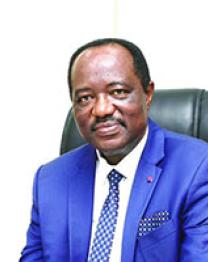
S.E. M. Salomon Eheth is currently the Extraordinary and Plenipotentiary Ambassador and Permanent Representative at the Permanent Mission of the Republic of Cameroon.
Lisa Emelia Svensson is a Swedish diplomat and with over 25 years of international experience in diplomacy, expert in environmental and digital policies, particularly in ocean governance and sustainability.
She has been posted in New York, Washington D.C., Brussels, Nairobi and Genève. She worked for the European Commission, United Nations and the Swedish Ministry for the Environment. She has a PhD in Political Economy, focusing on government strategies for economic growth. She been a Diplomat-in-Residence at Johns Hopkins University (SAIS), where she conducted research on climate and environmental policy. She served as Sweden’s Ambassador for Corporate Social Responsibility and Ambassador for Ocean, Seas, and Freshwater.
She headed the Marine Branch at the UN Environment Programme, and tackled issues like marine pollution, coral reef protection, and the sustainable blue economy. She led negotiations on sustainable development chapters behalf of the European Commission in EU free trade agreements with ASEAN, MERCOSUR, and ACP regions. Authored Combating Climate Change: A Transatlantic Approach to Common Solutions (2008), and the Handbook on the Economics and Management of Sustainable Oceans, published by Edward Elgar Publishing Ltd (2017).
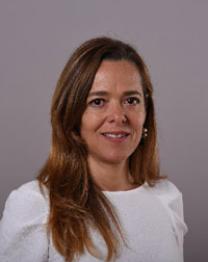
Monica Rubiolo is Head of Trade Promotion at the Swiss State Secretariat for Economic Affairs SECO.
She leads SECO’s efforts to foster trade in developing countries that is socially responsible, environmentally friendly, inclusive and thereby sustainable. This includes supporting framework conditions for sustainable trade, enhancing international competitiveness and market access of SMEs and producers alike, and strengthening a resource-efficient private sector in partner countries.
Monica Rubiolo obtained her PhD from the University of Tübingen, Germany, and published extensively on issues related to economic development. She was Assistant Professor at the Catholic University in Cordoba (Argentina) and has also taught at the Universities of Tübingen (Germany) and Bilbao (Spain). She has worked in Taipei, Taiwan, and at the European Institute of Latin American Studies (IRELA) in Madrid. She joined SECO in 2003, focusing on public financial management and financial sector support, before moving to Trade Promotion. She is member of the Boards of the Swiss Sustainable Coffee Initiative and Swiss Platform on Sustainable Cocoa.
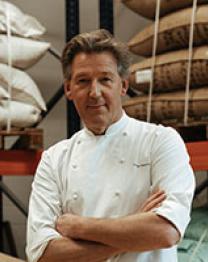
Pierre Marcolini – A life in chocolate
Born in Charleroi in 1964, Pierre Marcolini discovered his vocation at the age of 14 and decided to become a chocolatier, pastry and ice-cream maker. After graduating from CERIA and training with Pierre Hermé at Fauchon in Paris, he quickly distinguished himself by winning several prestigious awards, including the International Grand Prix Mandarine Napoléon in 1991 and the title of World Pastry Champion in Lyon in 1995 – the only Belgian to have achieved this distinction to date.
In 1995, he opened his first workshop near Brussels, followed by boutiques in Avenue Louise (1996) and the Grand Sablon (1997), which soon became the brand’s flagship. His creativity and rigor led him to develop new concepts such as the “Malline” presentation box, Carré² Chocolat, and the seasonal collections “Chocolate Seasons.”
A pioneer in mastering the entire process of chocolate-making, from bean to bar, Pierre Marcolini placed independence and excellence at the heart of his craft. This vision translated into responsible plantations, sustainable cocoa sourcing, and a constant attention to biodiversity. By working directly with growers and valuing the origin, variety, and story of each cocoa bean, he has created chocolates that reflect both terroir and people.
This ethical commitment took shape with the launch of the Grands Crus collection in 2009, reinforcing his philosophy of traceability and respect for planters. Each creation highlights not only cocoa’s aromatic richness but also the savoir-faire of local communities, with whom Marcolini builds lasting relationships founded on fairness and responsibility.
The House of Pierre Marcolini has since expanded worldwide, with boutiques in Tokyo, Paris, London, Dubai, Shanghai, Seoul, and many other capitals. In 2020, he was unanimously elected Best Pastry Chef in the World by the World Pastry Stars, a crowning achievement in a career devoted to innovation, sustainability, and passion.
In addition to his boutiques, Pierre Marcolini has published several reference books, including « Eclats », « Dix petits doigts plein de chocolat », « Best of Pierre Marcolini », and « Chocolat – Carnets de Voyages ».
Today, the brand is present in over 10 countries with 60 boutiques worldwide, embodying Belgian excellence on an international scale. As President of the Brussels Expertise Label (BEL) and referent member of the Culinary College of Belgium, Pierre Marcolini continues to share his vision of “Chocolat d’Auteur”, one that celebrates biodiversity, respects local growers, and embraces the bean-to-bar philosophy.
Emma Algotsson is the founder and project lead of Catchgreen, a South African startup and collaborative research initiative tackling marine sustainability. Under her leadership, Catchgreen has pioneered the development of specialized marine compounds and executed successful fishing net trials—including pilot programs in Kenya focused on seaweed farming and gear exchange. These innovations directly address critical challenges such as abandoned, lost, or discarded fishing gear (ALDFG), ghost fishing, and ocean plastic pollution.
With over eight years of experience in the trade and manufacturing of biodegradable and compostable plastics, Emma is also the founder of the South African Compostable Plastics Council (COPCO). COPCO advocates for the compostable plastics industry, promoting alignment with international certification standards and driving sustainable product innovation.
Emma holds an M.Phil from the University of Cambridge and a CPE in Law from City, University of London. Her work is driven by a deep commitment to creating solutions that serve both the planet and its people.
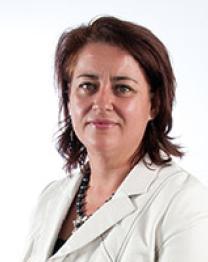
Adrie El Mohamadi is a Component Manager at the Deutsche Gesellschaft für Internationale Zusammenarbeit (GIZ), where she leads two donor-funded projects advancing the biotrade sector across South Africa and its neighbouring countries. With over 20 years of experience in project management, innovation, competitiveness, and sector development, she bridges political, business, and academic networks to drive systemic change in complex environments in various sectors.
She led the integration of Swiss- and German-funded biotrade initiatives within the GIZ cluster engaging with private sector, coordinated the inaugural African Biotrade Festival (ABF) in 2023 and co-facilitated its second edition in partnership with the South African Department of Forestry, Fisheries and the Environment (DFFE) and the Department of Trade, Industry and Competition (the dtic) in 2025.
Under her stewardship ABioSA is currently in its second phase with discussion for the next phase starting in 2026. The programme continues to prioritise ABS-compliance, market access and SMME support while catalysing private-sector collaboration and sector-wide development plans for key indigenous value chains, aligning stakeholders from all the important spheres of the economy.
She holds a Master of Business Administration (MBA).

Dr Ebenezer Laryea is a Reader (Professor) in Law at Aston University and Project Director for the Fresh Produce Impact Hub (FRESHPPACT), a research and development hub delivering practical solutions to plastic pollution within Ghana’s fresh-produce manufacturing and supply chains.
He also leads the LeatherTrace Bangladesh project, a pioneering initiative developing and piloting a digital e-traceability system which aims help Bangladesh’s tannery sector meet international environmental and social compliance standards across global value chains.
Ebenezer's research centres on Sustainability and Sustainable Development Law - spanning areas such as plastics, traceability, human rights, climate justice, social impact, net zero, and decarbonisation - where he has produced several research and knowledge exchange outputs.
His most recent work is a researched national policy report that sets out a practical blueprint for Ghana’s transition from conventional plastic products to plastic alternatives and non-plastic substitutes, advancing sustainable industrial practice and trade in sustainable alternatives.



